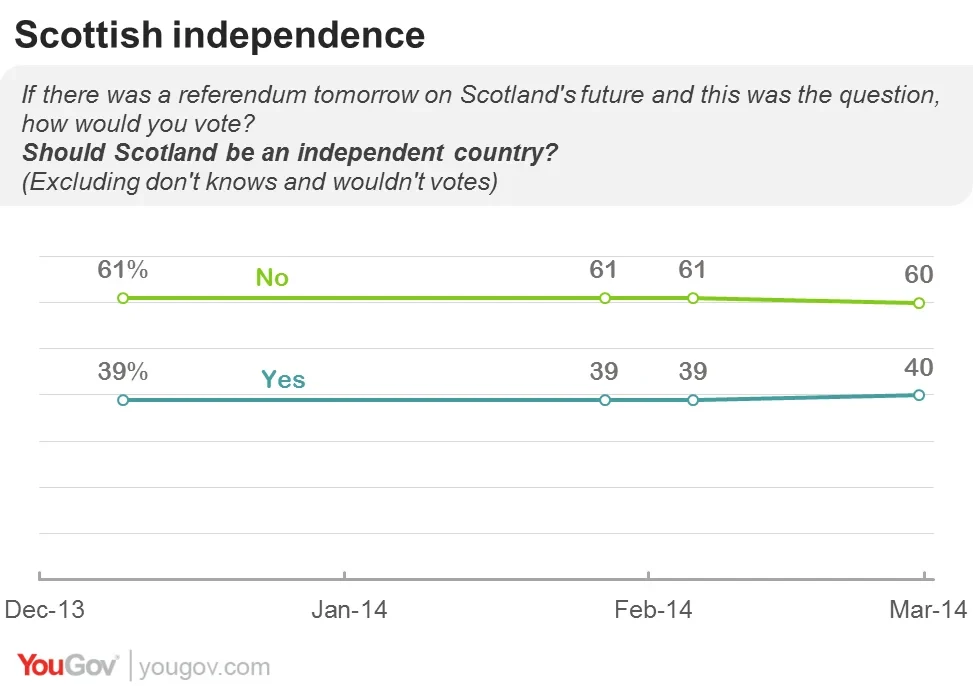I bring important news from Scotland. Nothing much is changing.
I realise this will disappoint those people, journalists in particular, for whom stability is boring, bereft of news value and therefore to be ignored. In this case, however, I believe the stability in Scottish views of independence tells us something significant: that most voters have made up their minds. By three-to-two they want to stay within the United Kingdom. Something dramatic will need to happen over the next six months for that verdict to change.
YouGov has conducted four surveys in the past three months. Our latest was conducted last week for the Scottish Sun. Stripping out the (modest) number of don’t knows, each survey has shown 39-40% in favour of independence and 60-61% against.

That is not all. Sometimes stable aggregate numbers conceal large two-way shifts of opinion that simply cancel each other out. This does not look like happening this time. Rather, the ‘yes’ and ‘no’ blocks look equally solid and utterly distinct. They differ completely in their party loyalties and their expectations of what an independent Scotland would look like.
Here’s the evidence. First, party loyalties. SNP supporters divide 90-10% in favour of independence; Labour, Conservative and Liberal Democrat supporters divide 90-10% against independence. Alex Salmond’s biggest problem is that the three ‘British’ parties collectively outscore the SNP by three-to-two. Hence the three-to-two margin in favour of ‘Better Together’.
Second, how Scots view the practical consequences of Scotland going its own way. Eight out of ten supporters of independence think people like them will become better off; eight out of ten opponents expect to be worse off. On taxes, pensions, schools and Scotland’s influence in the world, ‘yes’ voters expect sharply different things. And those differences are growing, rather than narrowing.
What about Scottish reactions to the joint announcement by the Tories, Labour and Lib Dems that they would reject a currency union with an independent Scotland? By 79-10%, ‘yes’ supporters think London is bluffing; by 73-11%, ‘no’ voters believe London means it.
The story is much the same regarding the likelihood of an independent Scotland staying in the European Union. 70% of ‘yes’ voters reckon that their country would be EU members from day one – a view shared by just 15% of ‘no’ voters.
Passionate supporters of the main Britain-wide parties might regard all this as par for the course: aren’t Labour and Conservative voters equally polarised on the big issues facing Britain? Actually, they are not. Normal Labour and Tory supporters, as distinct from tribal enthusiasts, tend to differ only modestly in their beliefs, wishes and expectations. From immigration to hospitals, from taxes to Europe, views overlap to a large degree. In contrast, Scotland’s two big tribes – pro-independence SNP supporters and anti-independence opponents of the SNP – seem to be as different as Disraeli’s two nations, ‘between whom there is no intercourse and no sympathy’.
With six months to go, can Alex Salmond seize victory from the jaws of defeat? His big challenge is to persuade people not so much that independence is a noble ambition, as that it won’t have serious side effects – on prosperity, the currency and Scotland’s place in Europe.
Two overlapping groups hold the key. The first is working class Labour voters. These are the people who switched in large numbers to the SNP in the 2011 elections to Holyrood, and delivered Salmond his overall majority. They have shown that they can reject Labour’s message once. Can they be persuaded to do so again?
The second group are Scotland’s women. Men divide evenly, 48% for independence, 52% against. In contrast, women divide 68-32% against independence. That excludes don’t knows – and there are many more women (16%) than men (7%) who have yet to take sides. In general, women are more fearful of the practical consequences of independence.
More than anything else, Salmond must convince around 300,000 more Scottish voters than he has so far that they have little to fear from their country leaving the United Kingdom. So far, they have stubbornly refused to share his optimism. He has just under 200 days to break down their resistance.
Want to receive Peter Kellner's commentaries by email? Subscribe here
Image: Getty







